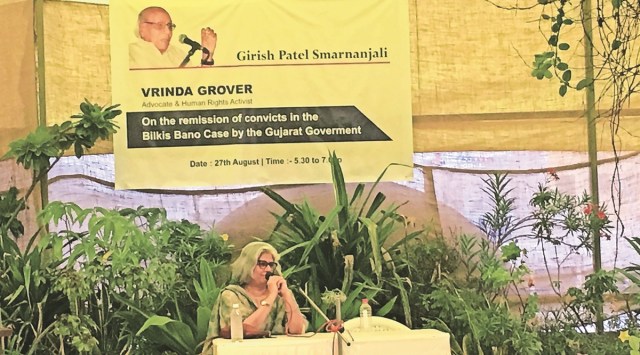Vrinda Grover says Gujarat government’s decision in Bilkis case meant to ‘erase truth of 2002 riots’
Grover said that the decision comes very close to the Supreme Court’s judgement in the Zakia Jafri case where activist Teesta Setalvad was “demonised”.
 Vrinda Grover in Ahmedabad on Saturday. (Express Photo)
Vrinda Grover in Ahmedabad on Saturday. (Express Photo)Speaking on the remission granted by Gujarat government to the 11 convicts of the Bilkis Bano case, advocate and human rights activist Vrinda Grover on Saturday said that the decision is a part of the effort to “erase” the “truth of 2002 riots”.
Noting that the decision comes very close to the Supreme Court’s judgement in the Zakia Jafri case where activist Teesta Setalvad was “demonised”, Grover said, “This method being adopted to demonise activists is part of a larger thing…the Bilkis remission to my mind is actually part of erasing the truth of 2002…except for the Sabarmati train burning, everything else that happened in 2002 is being sought to be erased. That is the erasure we are looking at and it is not new… State is a creature of habit and it has patterns, testing these patterns across different constituencies of people and which is why this phrase of ‘Gujarat model’ is so chilling,” she added.
Commenting on the legal aspect of the remission of the convicts in the Bilkis case, Grover pointed out that the transfer of the trial of the case from Gujarat to Maharashtra by SC inherently reflected the “complicity or the collapse of the system – be it the police, the prosecution or the judicial system (of Gujarat)…”
Further pointing out that the 1992 remission policy will indeed be applicable in this case and there’s nothing wrong with the same, Grover highlighted that the policy however only stated that those who have spent 14 years of their conviction are eligible for consideration of remission and “does not mean that the jail doors should be thrown open for them”, Grover questioned if 11 convicts can be reformed on the same day and termed such a decision to be “incredulous”. Moreover, Grover added that despite the applicability of Gujarat’s 1992 policy, given that the case was probed by CBI, consultation of the Centre was mandatory and in case of such consultation, the early release will be barred due to recent guidelines that does not permit grant of remission to rapists.
“The concurrence of the central government is mandatory so I’m going to assume that their concurrence was taken, which means the Ministry of Home Affairs has endorsed, concurred and agreed about this decision on the same day when the Prime Minister addressed ‘Mahila samman,” Grover remarked.
Grover also added that the safety assessment for Bilkis too should have been a factor weighing with the Jail Advisory Committee (JAC) while deciding on the release of the 11.
Citing the Indian Express report on Muslims fleeing from the village where the convicts live after their release , Grover said,“ There is a SC judgement which lays down four criteria which the advisory committee has to ask (while granting remission)…The first question is, ‘was this crime only to the individual or does it affect society?’. In this case it affects society for all manner of reasons because of the targeting of the community. So on that question itself the remission comes to a grinding halt. Another question is whether the remission will affect the society of others…Muslim families have left and that shows this is affecting others apart from Bilkis.”
Pointing out other lapses in the decision of the premature release, Grover pointed out that the then trial court judge UD Salvi has made statements in the media that his opinion was not taken by the JAC, in contravention of the remission policy, and had it been taken it would have been in the negative.
Grover remarked that however the remission of the 11 convicts reek of the “impunity of a majoritarian penal and carceral state.”
With two petitions at the Supreme Court now challenging the remission of the 11 convicts, Grover emphasised that the court not only needs to look at their remission, “but the fact of the message conveyed by those videos posted where these convicts were feted, celebrated for their homecoming.”







